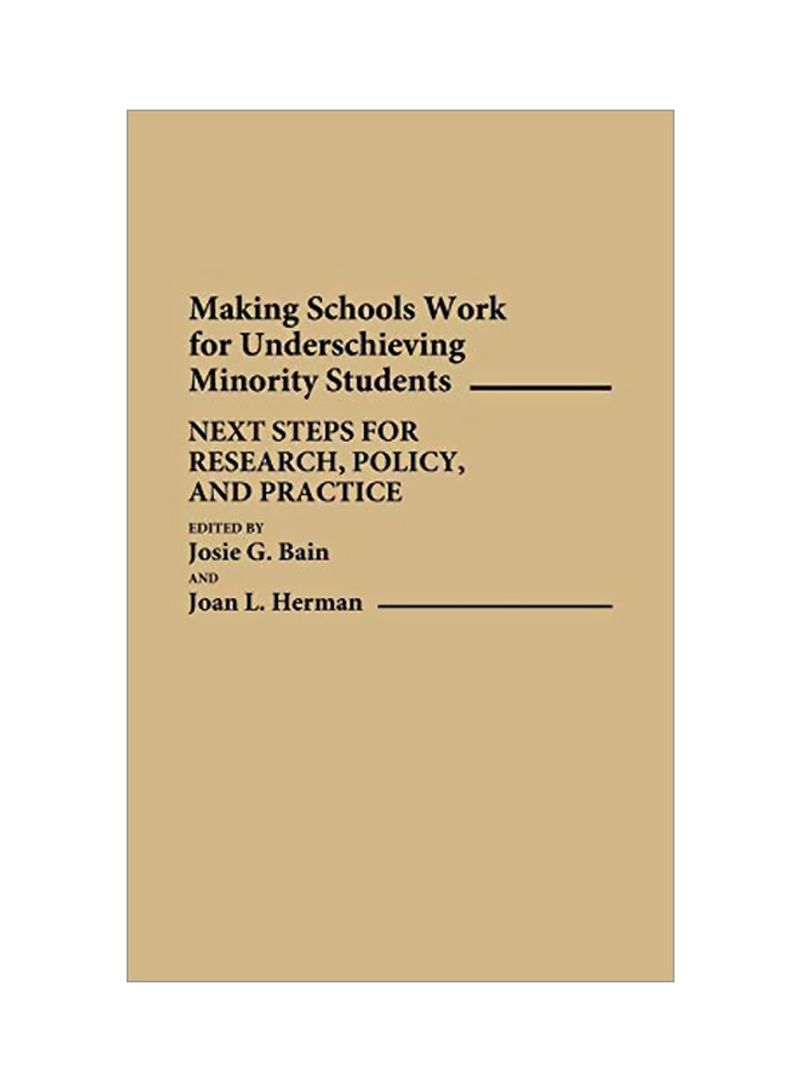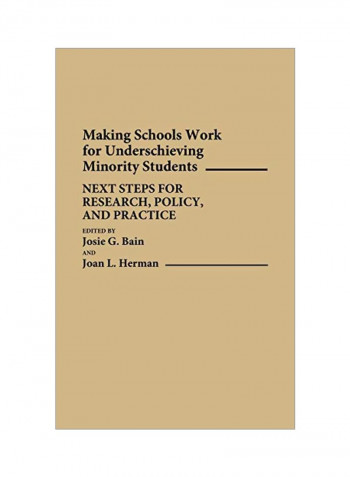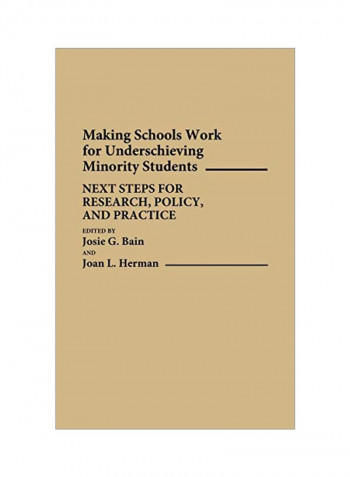Making Schools Work For Underachieving Minority Students: Next Steps For Research, Policy, And Practice Hardcover
Recommend
Sort by
Rating
Date
Specifications
Grade
New
Book Description
Labeled A Nation at Risk, Americans are urgently seeking reform in their public school systems. While many promising programs are being developed, they have not yet been validated. The national conference Making Schools Work for Underachieving Minority Students shared the best of what is presently known and deliberated on the implications for research, policy, and practice. Sponsored by CRESST (Center for Research on Evaluation Standards and Student Testing), The National Urban League, and the National Council of LaRaza, the conference was financed by the U.S. Department of Education. Closely following the structure of the conference, this volume's contributors examine education's current status. They then investigate potentially promising approaches to specific problem areas. Contributors treat issues of evaluation and testing, and conclude by addressing the potential of collaborative efforts. Responding to a major challenge, community groups and organizations throughout the country are seeking answers to the problem of underachieving minority students. This volume builds on these shared interests and is a first step toward an intervention process. Topics covered include: creating effective instructional programs; reducing the dropout rate; preparing students for secondary and postsecondary success; helping limited English proficient students; and improving teacher quality. The volume's contributors hope to promote dialogue on promising practices, foster collaboration, identify critical R & D needs and collaborative arrangements, and identify testing and evaluation issues for subsequent inquiry.
ISBN-13
9780313268892
Language
English
Publisher
Greenwood Press
Publication Date
01 Aug 1990
Number of Pages
320
About the Author
JOSIE G. BAIN is an Education Professional in Residence at the CRESST/UCLA Center for the Study of Evaluation. She is the former area superintendent and associate superintendent of instruction for LAUSD and the coauthor of Strategies for Developing and Monitoring Community-Based Programs. JOAN L. HERMAN is Associate Director at the CRESST/UCLA Center for the Study of Evaluation. She is the coauthor of Strategies for Developing and Monitoring Community-Based Programs and Evaluation Handbook.
Editor 1
Josie G. Bain
Editor 2
Joan L. Herman
Editorial Review
?A welcome addition to the new literature on the disadvantaged student, this volume derives from a national conference convened at UCLA in 1987. Both in its organization and contents this book conveys a sense of the conference presentations. The editors have skillfully brought together a provocative mix of keynote addresses, panel presentations, informal interactions, and substantively argued position papers. These are arranged in five disparate but interrelated sections: Our National Dilemma, ' Promising Practices' Role of Testing & Evaluation in Improving Education for Under-Achieving Minority Students, ' Collaborative Arrangements, ' and Making Schools Work for Under-Achieving Minority Students.' As in all such collections, the results are mixed. Of special note are Henry Levin's The Educationally Disadvantaged Are Still Among Us' and Barbara Sizemore's Effective Education for Underachieving African-Americans.'... Recommended for larger collections in education, upper-division undergraduate level and above.?-Choice ?The product of a 1987 national conference initiated by the Center for Research on Evaluation, Standards, and Student Testing at UCLA and held in collaboration with the Council of Great City Schools, the National Urban League, and the National Council of La Raza, this collection of essays is a response to the major challenge of helping underachieving minority students succeed in school. Topics covered in the 30 essays include creating effective instructional programs, reducing dropout rates, preparing students for secondary and postsecondary succcess, helping students who have limited Englishg proficency, and improving teacher quality. Contributors hope to promote promising practices, foster collaboration, identify research needs, and point out issues of testing and evaluation procedures.?-The Education Digest "A welcome addition to the new literature on the disadvantaged student, this volume derives from a national conference convened at UCLA in 1987. Both in its organization and contents this book conveys a sense of the conference presentations. The editors have skillfully brought together a provocative mix of keynote addresses, panel presentations, informal interactions, and substantively argued position papers. These are arranged in five disparate but interrelated sections: Our National Dilemma, ' Promising Practices' Role of Testing & Evaluation in Improving Education for Under-Achieving Minority Students, ' Collaborative Arrangements, ' and Making Schools Work for Under-Achieving Minority Students.' As in all such collections, the results are mixed. Of special note are Henry Levin's The Educationally Disadvantaged Are Still Among Us' and Barbara Sizemore's Effective Education for Underachieving African-Americans.'... Recommended for larger collections in education, upper-division undergraduate level and above."-Choice "The product of a 1987 national conference initiated by the Center for Research on Evaluation, Standards, and Student Testing at UCLA and held in collaboration with the Council of Great City Schools, the National Urban League, and the National Council of La Raza, this collection of essays is a response to the major challenge of helping underachieving minority students succeed in school. Topics covered in the 30 essays include creating effective instructional programs, reducing dropout rates, preparing students for secondary and postsecondary succcess, helping students who have limited Englishg proficency, and improving teacher quality. Contributors hope to promote promising practices, foster collaboration, identify research needs, and point out issues of testing and evaluation procedures."-The Education Digest



